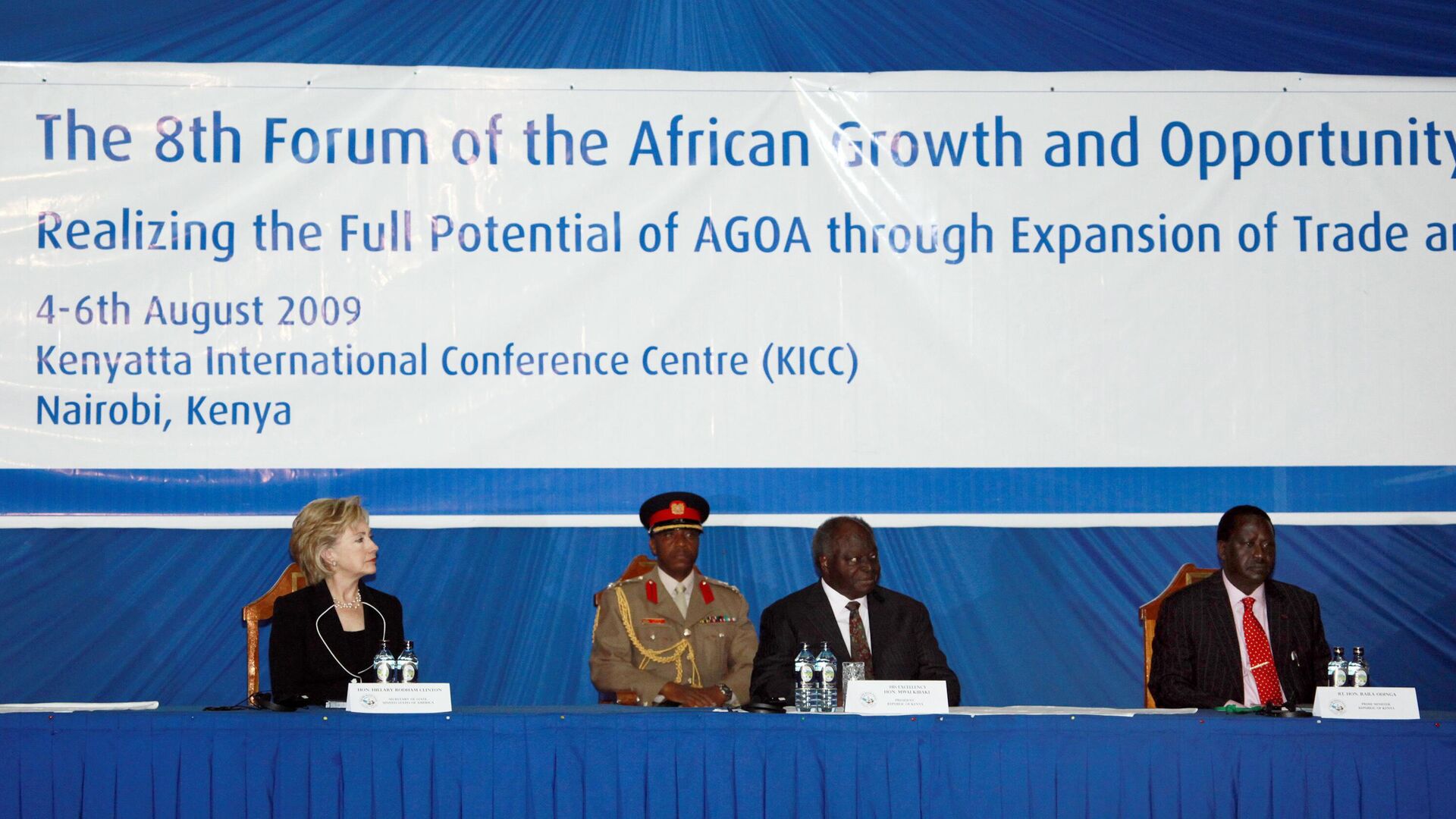https://en.sputniknews.africa/20230511/us-agoa-trade-program-poses-risk-for-african-nations-world-bank-reveals-1059181989.html
US' AGOA Trade Program Poses Risk for African Nations, World Bank Reveals
US' AGOA Trade Program Poses Risk for African Nations, World Bank Reveals
Sputnik Africa
A non-reciprocal trade agreements, such as the African Growth and Opportunity Act (AGOA), pose a significant risk to economies of developing countries due to the possibility of abrupt suspension, the World Bank said.
2023-05-11T14:00+0200
2023-05-11T14:00+0200
2023-05-11T14:00+0200
sub-saharan africa
united states (us)
african growth and opportunity act (agoa)
trade
export
https://cdn1.img.sputniknews.africa/img/07e7/05/0b/1059181820_9:0:2990:1677_1920x0_80_0_0_e5ba77c975b1696102c56c753b798b60.jpg
Non-reciprocal trade agreements, such as the African Growth and Opportunity Act (AGOA), pose a significant risk to the economies of developing countries due to the possibility of abrupt suspension, the World Bank said in its report on uncertainty in preferential trade agreements. The report indicated that suspension from the agreement brought about a 39% drop in the suspended countries' exports to the United States.Clothing and textiles were especially affected, with a drop of around 88%. The decline in exports is much less in other sectors, such as agriculture, industry, minerals and petroleum.The impact on exports to the United States for countries in sub-Saharan Africa varies depending on the length of the suspension, the rate of use and the products affected, the report stated. Meanwhile, the possibility of unilateral removal of preferences by the granting country creates uncertainty for the participating states and their firms in particular, which results in reduced use of preferences, despite their existence.Therefore, the report concluded, developing countries, including African nations, should move away from non-reciprocal agreements, such as AGOA, as they could represent a significant risk and create uncertainty. The World Bank also recommended African states to diversify their export markets and boost regional integration in order to make their exports more resilient. Launched in 2000, the AGOA is set to expire in 2025. It allows the countries of sub-Saharan Africa to export to the United States without customs duties. At the same time, there is another system, a Generalized System of Preferences (GSP), launched in 1974, allowing duty-free access to the American market for some 5,000 other products. Under these two systems, the preferential treatment of goods is not reciprocal.Washington updates the list of sub-Saharan African countries eligible for AGOA every year according to their progress or setbacks in democracy, their commitment to the market economy, respect for the rule of law and policies to combat poverty.
https://en.sputniknews.africa/20221216/1058500178.html
united states (us)
Sputnik Africa
feedback@sputniknews.com
+74956456601
MIA „Rossiya Segodnya“
2023
News
en_EN
Sputnik Africa
feedback@sputniknews.com
+74956456601
MIA „Rossiya Segodnya“
Sputnik Africa
feedback@sputniknews.com
+74956456601
MIA „Rossiya Segodnya“
african growth and opportunity act (agoa), us, sub-saharan africa, preferential trade agreement, suspension, trade
african growth and opportunity act (agoa), us, sub-saharan africa, preferential trade agreement, suspension, trade
US' AGOA Trade Program Poses Risk for African Nations, World Bank Reveals
The African Growth and Opportunity Act (AGOA) is a US trade law that provides eligible sub-Saharan African states with duty-free access to the US market for over 1,800 products. Since its launch, several countries, including Ethiopia, Mali, Guinea and Cameroon have been suspended from the program.
Non-reciprocal trade agreements, such as the African Growth and Opportunity Act (AGOA), pose a significant risk to the economies of developing countries due to the possibility of abrupt suspension, the World Bank said in its
report on uncertainty in preferential trade agreements.
The report indicated that suspension from the agreement brought about a 39% drop in the suspended countries' exports to the United States.
Clothing and textiles were especially affected, with a drop of around 88%. The decline in exports is much less in other sectors, such as agriculture, industry, minerals and petroleum.
The impact on exports to the United States for countries in sub-Saharan Africa varies depending on the length of the suspension, the rate of use and the products affected, the report stated.
Meanwhile, the possibility of unilateral removal of preferences by the granting country creates uncertainty for the participating states and their firms in particular, which results in reduced use of preferences, despite their existence.
Therefore, the report concluded, developing countries, including African nations, should move away from non-reciprocal agreements, such as AGOA, as they could represent a significant risk and create uncertainty. The World Bank also recommended African states to diversify their
export markets and boost regional integration in order to make their exports more resilient.
"African countries in turn need to diversify their export markets, including to East Asia and looking inward by strengthening regional trade with their neighbors," read the report.
Launched in 2000, the AGOA is set to expire in 2025. It allows the countries of sub-Saharan Africa to export to the United States without customs duties. At the same time, there is another system, a Generalized System of Preferences (GSP), launched in 1974, allowing duty-free access to the American market for some 5,000 other products. Under these two systems, the preferential treatment of goods is not reciprocal.
Washington updates the list of sub-Saharan African countries eligible for AGOA every year according to their progress or setbacks in democracy, their commitment to the market economy, respect for the rule of law and policies to combat poverty.


